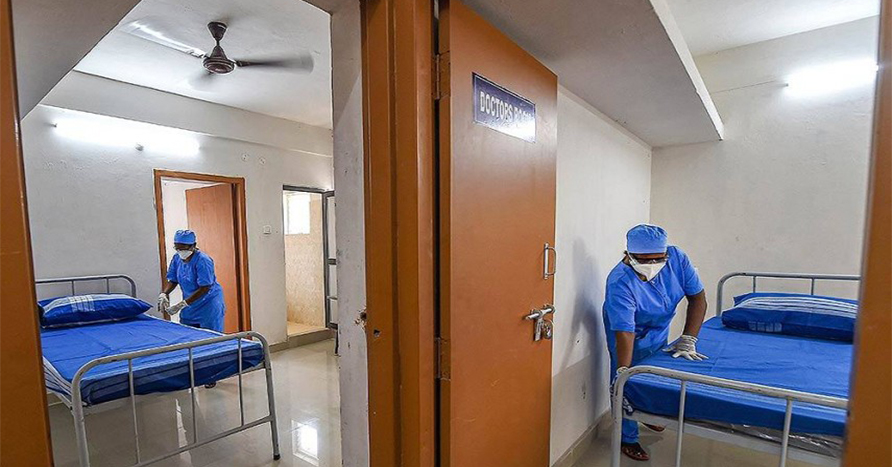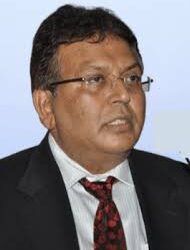By undermining the reservation system in health education, the government may undo the public healthcare system.
Health workers prepare a temporary set-up of 1,450 beds for COVID-19 patients, during the ongoing nationwide lockdown, in Chennai, Saturday, May 30, 2020. Tamil Nadu Housing board quarters converted into a COVID Care Centre for quarantine.
Dr Sakthirajan, Medical professional in Tamil Nadu
Till the onset of a pandemic, the public health system conjured up an image of medical institutions (ranging from primary health centres to medical colleges) that were both unclean and mediocre. It was meant for those who cannot otherwise afford health. The private health sector, on the other hand, was seen as a saviour of the Indian elite.
COVID-19 is an unfortunate event, yet I believe that it has enlightened us and steered us towards a debate on the merit and contributions of the private health sector in public health, as well as the dire necessity to save the ‘drowning‘ public health system.
Since day one of the lockdown in March, I have been a witness to how the entire public healthcare system has remarkably risen to the occasion in Tamil Nadu. From doctors to sanitary workers, frontline workers involved in handling the crisis have been working around the clock, often compromising their own health and safety, while private clinics and private hospitals remaining entirely shut. With increasing cases of COVID-19 in Gujarat, we see the government ordering the private health sector to open up medical institutions in Ahmedabad or face punishment.
The situation is so serious in Maharashtra that the government went a step ahead and has threatened to cancel the practicing licenses of private doctors who are not willing to work for COVID-19 patients in government hospitals. The examples only show a very distinct lack of social responsibility in the private health sector.
But on the contrary, the Tamil Nadu public health system, with nearly 18,000 doctors (about 12,000 working in rural areas) and lakhs of nurses and paramedics, has not received a single resignation letter. There have been no reports of frontline health workers abandoning their responsibilities, even when doctors, postgraduates and nurses were infected. This achievement cannot be trivialised as wanting financial remuneration. As a doctor myself, I believe the real factor that keeps members of the public health system together is a sort of social binding.
A social bind is not built in a day, but through decades, essentially due to provisions of caste-based reservations that led to the entry of first-generation graduates like me into medical colleges. I can say with certainty that the 12,000 doctors serving in the rural Tamil Nadu are mostly from backward, most backward and scheduled castes. The upper-caste representation in these places is small (except in city-bound medical colleges).
Second, the most important factor is the provision of 50% reservation for government doctors in postgraduate education, thereby paving the way for career upgradation. It also makes a doctor work in the government sector till superannuation (as a compulsory bond till retirement exists for all government doctors in Tamil Nadu).
But the introduction of NEET as a sign of uniformity and the selection of so-called ‘meritorious’ students has become a stumbling block for first-generation students, and has made medical education a commodity for the urban elite irrespective of caste.
At this juncture, I find it reasonable to put forth that though Tamil Nadu has a rising incidence of COVID-19 due to multifactorial reasons, the case fatality rate (ratio of hospitalised patients to deaths due to COVID-19) is low when compared to all other States and this is only due to the service provided by doctors who have never written the NEET to prove their merit or capabilities. The onslaught of COVID-19 has very clearly established that NEET has never been and is no longer a measuring scale for merit. Continuing it any further will have dangerous repercussions for India’s health system of India.
Further, the Medical Council of India made an eminently unnecessary amendment which is actually beyond its jurisdiction. By this amendment, reservation for government doctors has to be given only in diploma seats and not in postgraduate degree seats, both in the all-India pool of seats and also in the seats governed by individual States.
This has been further complicated by the conversion of all diploma seats to degree seats last year, leading to the denial of entry to postgraduation courses for a government doctor working in rural areas. This has in turn made the government service less attractive and has doomed many careers. (Since they have to compete with those only studying in more luxurious settings, guided by expensive coaching centres).
Secondly, the non-provision of OBC reservation in the all-India pool of seats (50 % of seats from every medical colleges given from the individual States) by the Central health ministry for the past nine years has led to the loss of postgraduation opportunities for nearly 2,500 OBC medical undergraduates every year throughout India.
By the non-implementation of both these reservations for government doctors in the postgraduate medical education after the introduction of the National Medical Commission (NMC), the State and Central governments have gradually incapacitated the public health system even in States like Tamil Nadu and Kerala (considered the best performers). In the future, we might not even have a proper comprehensive public health system to handle a pandemic like COVID-19.
Given the immense contribution of the public health sector in handling a pandemic like this, the government must come forward to roll back all measures that would spell doom for the public health sector. Otherwise, the country will have to pay.
Courtesy: The Wire







